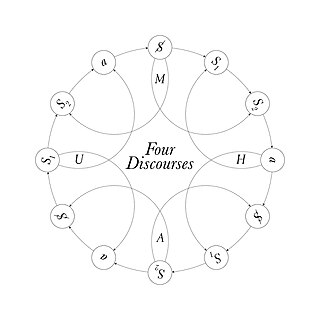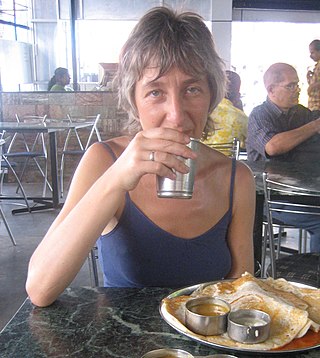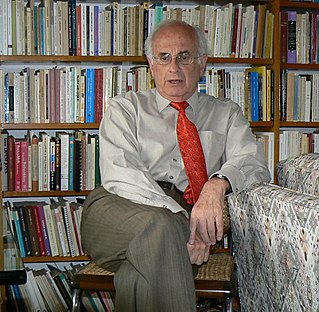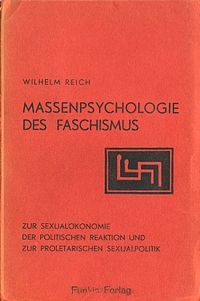
Jacques Marie Émile Lacan was a French psychoanalyst and psychiatrist. Described as "the most controversial psycho-analyst since Freud", Lacan gave yearly seminars in Paris, from 1953 to 1981, and published papers that were later collected in the book Écrits. His work made a significant impact on continental philosophy and cultural theory in areas such as post-structuralism, critical theory, feminist theory and film theory, as well as on the practice of psychoanalysis itself.
Psychoanalysis is a set of theories and therapeutic techniques that deal in part with the unconscious mind, and which together form a method of treatment for mental disorders. The discipline was established in the early 1890s by Sigmund Freud, whose work stemmed partly from the clinical work of Josef Breuer and others. Freud developed and refined the theory and practice of psychoanalysis until his death in 1939. In an encyclopedia article, he identified the cornerstones of psychoanalysis as "the assumption that there are unconscious mental processes, the recognition of the theory of repression and resistance, the appreciation of the importance of sexuality and of the Oedipus complex." Freud's colleagues Alfred Adler and Carl Gustav Jung developed offshoots of psychoanalysis which they called individual psychology (Adler) and analytical psychology (Jung), although Freud himself wrote a number of criticisms of them and emphatically denied that they were forms of psychoanalysis. Psychoanalysis was later developed in different directions by neo-Freudian thinkers, such as Erich Fromm, Karen Horney, and Harry Stack Sullivan.

Sándor Ferenczi was a Hungarian psychoanalyst, a key theorist of the psychoanalytic school and a close associate of Sigmund Freud.
Psychoanalytic film theory is a school of academic thought that evokes the concepts of psychoanalysts Sigmund Freud and Jacques Lacan. The theory is closely tied to Critical theory, Marxist film theory, and Apparatus theory. The theory is separated into two waves. The first wave occurred in the 1960s and 70s. The second wave became popular in the 1980s and 90s.
Psychoanalytic theory is the theory of personality organization and the dynamics of personality development relating to the practice of psychoanalysis, a clinical method for treating psychopathology. First laid out by Sigmund Freud in the late 19th century, psychoanalytic theory has undergone many refinements since his work. The psychoanalytic theory came to full prominence in the last third of the twentieth century as part of the flow of critical discourse regarding psychological treatments after the 1960s, long after Freud's death in 1939. Freud had ceased his analysis of the brain and his physiological studies and shifted his focus to the study of the psyche, and on treatment using free association and the phenomena of transference. His study emphasized the recognition of childhood events that could influence the mental functioning of adults. His examination of the genetic and then the developmental aspects gave the psychoanalytic theory its characteristics. Starting with his publication of The Interpretation of Dreams in 1899, his theories began to gain prominence.

Ernesto Laclau was an Argentine political theorist and philosopher. He is often described as an 'inventor' of post-Marxist political theory. He is well known for his collaborations with his long-term partner, Chantal Mouffe.
Juliet Mitchell, Lady Goody is a British psychoanalyst, socialist feminist, research professor and author.

Four discourses is a concept developed by French psychoanalyst Jacques Lacan. He argued that there were four fundamental types of discourse. He defined four discourses, which he called Master, University, Hysteric and Analyst, and suggested that these relate dynamically to one another.
Freudo-Marxism is a loose designation for philosophical perspectives informed by both the Marxist philosophy of Karl Marx and the psychoanalytic theory of Sigmund Freud. It has a rich history within continental philosophy, beginning in the 1920s and 1930s and running since through critical theory, Lacanian psychoanalysis, and post-structuralism.
Andrew Samuels is a British psychotherapist and writer on political and social themes from a psychological viewpoint. He has worked with politicians, political organisations, activist groups and members of the public in Europe, US, Brazil, Israel, Japan, Russia and South Africa as a political and organisational consultant. Clinically, Samuels has developed a blend of Jungian and post-Jungian, relational psychoanalytic and humanistic approaches.
Otto Fenichel was a psychoanalyst of the so-called "second generation".
The Discourse Unit is an international research group that currently has its main base at the University of Manchester in the United Kingdom. It has been one of the most important focal points for the development of critical work in psychology and in other social sciences concerned with questions of subjectivity and politics. The term "discourse" is used as a cover-all term for political studies of individual subjectivity that draw on feminism, Marxism, post-structuralism and psychoanalysis. In 2003, Ian Parker produced a document for the Discourse Unit that outlines the way that researchers in the group draw on these four theoretical resources. There is disagreement within the research group over the accuracy of this document.

Erica Burman is a critical development psychologist based in the United Kingdom. While little known in the developmental psychology research community, her work has been a conceptual resource for critiques of the field, notably feminist perspectives on the connections between different forms of oppression, and methodological debates in psychology.
The notion of the 'discursive complex' was developed by Ian Parker to tackle the twofold nature of psychoanalysis in Western culture. In his 1997 book Psychoanalytic Culture, Parker defines the 'discursive complex' as a 'methodological device. The term 'complex' is used quite deliberately to evoke the peculiarly Freudian and post-Freudian nature of the subjectivity people in the West live so much of the time. On the one hand the concepts that psychoanalytic texts employ are relayed through culture as components of a discourse, as objects that are circumscribed by definitions in academic and professional writing and used in advertising. In this sense, the discourse constitutes places for subjects to come to be, whether as a child with problems separating from the mother, as a teenager filled with frustration and resentment at authority, or as an older adult reflecting on an unfulfilled life and needs. The discourse thus positions the subject who is addressed by or who is employing the discourse to understand themselves or their troubling relationships. On the other hand, the discourse touches an already existing shape of subjectivity for those who write and speak about themselves and others, whether that is in the form of autobiography or in an advice column, in a television interview or on the couch with a therapist. It chimes with a theory of self that the subject has been invited to elaborate for themselves in this culture, and so it reconfigures each time some of the emotions that are available to them.

Néstor Alberto Braunstein was an Argentine-Mexican physician, psychiatrist and psychoanalyst.
Metapsychology is that aspect of any psychological theory which refers to the structure of the theory itself rather than to the entity it describes. The psychology is about the psyche; the metapsychology is about the psychology. The term is used mostly in discourse about psychoanalysis, the psychology developed by Sigmund Freud, which was at its time regarded as a branch of science, or, more recently, as a hermeneutics of understanding. Interest on the possible scientific status of psychoanalysis has been renewed in the emerging discipline of neuropsychoanalysis, whose major exemplar is Mark Solms. The hermeneutic vision of psychoanalysis is the focus of influential works by Donna Orange.

The Mass Psychology of Fascism is a 1933 psychology book written by the Austrian psychoanalyst and psychiatrist Wilhelm Reich, in which the author attempts to explain how fascists and authoritarians come into power through their political and ideologically-oriented sexual repression on the popular masses.
Psychoanalytic sociology is the research field that analyzes society using the same methods that psychoanalysis applies to analyze an individual.
Lacanianism or Lacanian psychoanalysis is a theoretical system that explains the mind, behaviour, and culture through a structuralist and post-structuralist extension of classical psychoanalysis, initiated by the work of Jacques Lacan from the 1950s to the 1980s. Lacanian perspectives contend that the world of language, the Symbolic, structures the human mind, and stress the importance of desire, which is conceived of as perpetual and impossible to satisfy. Contemporary Lacanianism is characterised by a broad range of thought and extensive debate between Lacanians.
Parveen Adams is a British psychoanalytic theorist and feminist. She was a cofounder, editor and contributor to the British socialist feminist journal m/f. Since then she has moved to apply psychoanalytic notions to art criticism.






